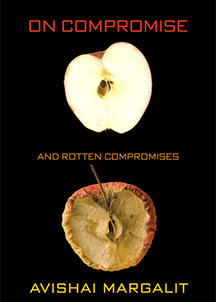By Krista Thomason
In a time when academic philosophy is becoming more and more specialized, Margalit’s On Compromise and Rotten Compromises is a reminder that philosophy is at its best when it tries to tackle the big questions facing humanity even when those questions seem insurmountably difficult. Margalit takes on two weighty tasks. First, he attempts to articulate the nature of political compromise—the “what is it” question that is the traditional first step of philosophical scholarship. Second, he argues that within the realm of political compromise, there are rotten compromises, or compromises we ought never make.
So what is compromise? Margalit argues that compromise has five basic elements. Compromise requires recognizing the other’s point of view, giving up what Margalit calls the “dream point,” mutual concession, overcoming deadlock, and non-coercion. The first two elements are what make compromise so difficult. When we agree to compromise, we must see the other party in negotiation not as an enemy, but in Margalit’s words, as “a rival.” Given that political compromises often take place between parties engaged in long-standing conflicts, the move from enemy to rival may look like an unbridgeable gap. Not only that, but we must give up the notion that the outcome of the compromise will be our glorious victory and the other’s defeat—we must give up our dream outcome in favor of something we know will be second best to both parties. The attempt to understand the nature of compromise reveals two visions of politics: politics as religion and politics as economics. Politics as religion holds that some things are inviolable and sacred, whereas politics as economics holds that there is always room for negotiation and exchange. Although we tend to think of these two as competing, Margalit astutely observes that we frequently maintain both visions simultaneously. The U.S. Constitution, after all, did not include the power to purchase land on behalf of the nation, but even Jefferson couldn’t pass up a bargain like the Louisiana Purchase. While politics as economics thrives on compromise, it is politics as religion that highlights rotten compromises.
A rotten compromise is a compromise that establishes or maintains a society of cruelty and humiliation. According to Margalit, this is the defining feature of a rotten compromise because it is an “attack on the very category in which morality is founded, that is, our shared humanity.” Political compromise at its best helps us to establish and achieve peace. War, like regimes of cruelty and humiliation, attacks our shared humanity, so peace is highly prized. And here is the tension Margalit rightly identifies: We should compromise in the name of peace, but what if the compromise that establishes peace is a rotten compromise? One of the virtues of the book is that Margalit does not shy away from historical examples. He argues that the Munich Agreement—the compromise that made “appeasement” a dirty word in politics—is a rotten compromise even though the primary goal of it was to avoid another world war. But the Munich Agreement is not a rotten compromise because Hitler did not keep up his end of the deal. Margalit indicts the agreement because it was made with Hitler, the head of a regime that epitomized attacks on shared humanity. The bold claim that Margalit makes is that rotten compromises, like the Munich Agreement, should not be signed even in the service of peace. Avoiding another war is not worth making a rotten deal with the “radical evil” of the Nazi rule.
Margalit’s arguments represent a small, but important voice in political philosophy. That voice insists that peace and justice are not complementary goods “like fish and chips,” but competing goods, “like tea and coffee.” Sometimes achieving justice means forgoing peace and sometimes establishing peace means forgoing justice. In Margalit’s view, too often political philosophy worries whether peace is sustainable rather than worrying whether it is just. Margalit’s claims are bold, and the arguments are at times scattered. But this is to be expected when one is taking on a difficult and thorny question. Margalit’s willingness to wade into the messy territory of rotten compromises is to be commended. In his words, the topic is important because of what we learn about ourselves: “Ideals tell us something about what we would like to be. But compromises tell us who we are.”
Krista Thomason (ΦBK, University of North Carolina at Greensboro, 2002) is a visiting assistant professor of philosophy at Swarthmore College.




